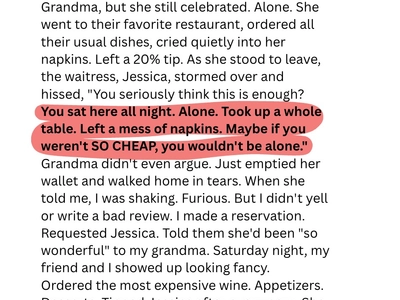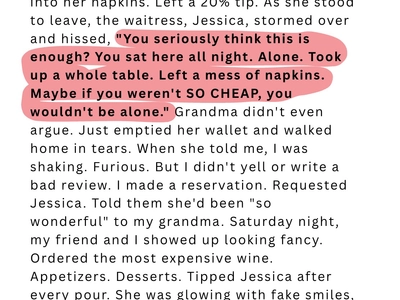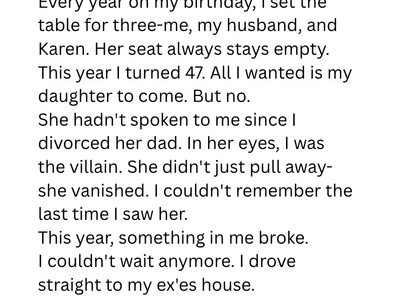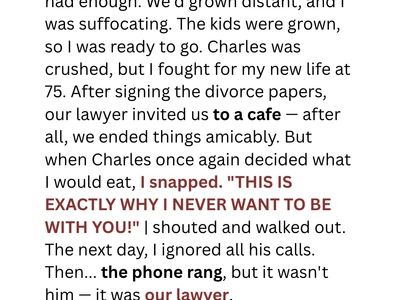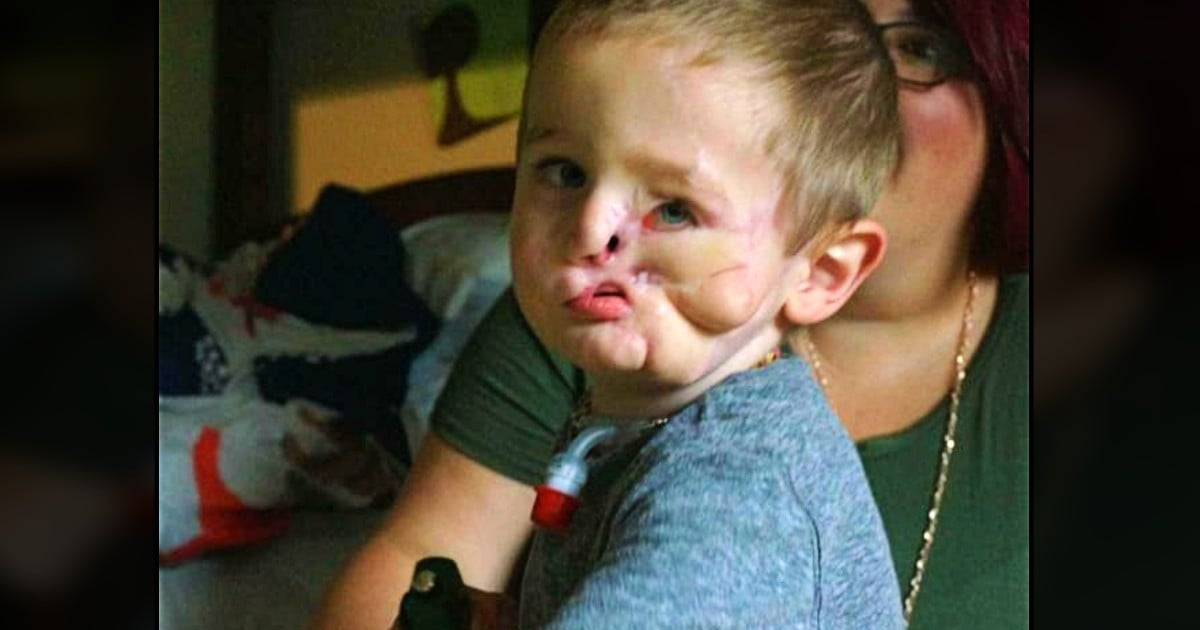Waitress Mocked My Grandma’s Tip — She Never Expected My Response
Last Wednesday marked what would have been my grandparents’ 50th wedding anniversary. For half a century, Doris and Walter had shared a love that was steady and simple, full of quiet moments and small traditions. Every year, they celebrated their anniversary at the same little restaurant in town — a cozy place with warm lighting and the smell of butter and roasted herbs always floating in the air.
But two years ago, Walter passed away. It had been hard on Grandma, harder than she let anyone see. She’d learned to fill her days with small routines, pretending everything was fine, though her house felt a little too quiet and her evenings a little too long. When their anniversary came around this year, she didn’t want to ignore it. She decided to honor the day the only way she knew how — by going back to that restaurant one more time.
She dressed carefully that morning, choosing a pale blue blouse Walter had once said made her eyes sparkle and pinning the silver brooch he’d given her for their 30th anniversary. Her hands shook a little as she fastened it, but she smiled at her reflection, whispering, “For you, Walt.”
When she arrived at the restaurant, she asked for their usual table near the window — the one where they’d sat side by side, watching the world pass by outside. She ordered what they always ordered: roast chicken, mashed potatoes, and a slice of pecan pie to share. This time, of course, there would be no one to share it with.
Still, she sat tall, eating slowly, remembering his laughter, his habit of cutting his potatoes into perfect little squares, his way of joking with the servers. When the bill came, she counted her money carefully. She’d set aside just enough for the meal, the bus fare home, and a small 20% tip — not much, but as much as she could manage. She tucked the cash under the receipt, placed her fork neatly on the plate, and began to gather her things.
That’s when the waitress — a young woman named Jessica — walked by and snatched the check from the table. She frowned at the tip and muttered loudly enough for Grandma to hear, “Wow, all that and she leaves this? Guess she’s as cheap as she looks.” Then she added, laughing, “No wonder she’s eating alone.”
The words hit like a slap. Grandma froze, her cheeks burning, her eyes stinging. She didn’t say anything — she just stood up, clutching her purse, and walked out. She cried quietly the whole bus ride home.
The next morning, when she told me what had happened, her voice trembled. She tried to downplay it, saying she was “too sensitive,” but I could hear the hurt behind her words. My grandmother, who had never been unkind to anyone, had been mocked for doing something so beautiful and brave — honoring a love that had lasted half a century.
I was furious. My first instinct was to go online, tell the story, and let the internet take care of Jessica. But Grandma asked me not to. “I don’t want trouble,” she said softly. “Just let it go.”
I couldn’t let it go. But I could respect her wish to keep it quiet. So I came up with another plan — something quieter, more personal, but just as powerful.
Two days later, I called the restaurant and made a reservation under my name. I asked specifically for Jessica to be our waitress. The hostess didn’t hesitate, and the booking was confirmed for Saturday evening. I invited a friend to come along and told him the whole story. We agreed to play the part — polite, well-dressed diners out for an expensive night.
We arrived early, wearing our best clothes. I made sure we looked like people who might leave a tip big enough to make a waitress’s week. When Jessica saw us, her face lit up with the kind of professional smile that only deepened my resolve. She greeted us sweetly, handed us menus, and treated us with careful charm.
We ordered appetizers, wine, the most expensive entrées on the menu — everything she’d expect from high-paying customers. She checked on us often, refilling our glasses, laughing at our small talk, making sure everything seemed perfect. She was probably already thinking about the tip she’d get at the end of the night.
When dessert came — two slices of pecan pie — I asked for the check. She brought it over with a smile. That’s when I reached into my jacket and pulled out an envelope.
“Before I sign this,” I said calmly, “I want to give you something.”
I handed her the envelope, which she accepted with a curious look. Then I stood up and said, “Go ahead, open it.”
Inside were a handful of neatly folded napkins. On each one, I’d written a message in bold black ink. The first said, “You should be ashamed.” The next: “She’s a widow, not a wallet.”
Jessica’s smile vanished. Her eyes flicked up to mine, confused and pale.
“You remember Doris?” I asked quietly. “The lady you insulted for leaving a small tip — on what would have been her 50th anniversary?”
She said nothing. Her face flushed, and her lips began to tremble.
“That woman is my grandmother,” I continued. “She saved for weeks to afford that meal. You mocked her for not giving you more — on the hardest day of her year. You made her cry all the way home.”
The restaurant had grown silent. The table next to us stopped talking; even the clinking of cutlery seemed to fade. Jessica looked down, tears forming in her eyes.
I didn’t raise my voice. I didn’t insult her. I just said, “Next time you decide to be cruel to someone, remember that kindness costs nothing — and you never know what someone’s going through.”
Then I placed the bill, paid in full, and walked out.
The next morning, my phone rang. It was the restaurant manager. He sounded uneasy but sincere. He said he’d heard about what happened — both incidents — and wanted to apologize personally. Jessica, he told me, no longer worked there. He assured me that what my grandmother had experienced was unacceptable and that he wanted to make things right.
He invited Grandma and me back for dinner that weekend, “on the house,” he said, to celebrate the anniversary properly. I hesitated at first, unsure if Grandma would want to return to the place that had made her cry. But when I told her about the call, she smiled faintly and said, “Maybe it’s time to rewrite the memory.”
That Saturday, we went together. She wore the same blouse, the same brooch, and a soft pink lipstick she hadn’t worn in years. When we arrived, the manager greeted us at the door and personally led us to their old booth by the window. Fresh flowers sat in a small vase on the table — white lilies and yellow roses, Walter’s favorite.
The atmosphere was warm, almost glowing. Our new server, a young man named Aiden, treated Grandma with genuine respect and care. He called her “Mrs. Thompson,” pulled out her chair, and listened patiently when she told him about the anniversary. He didn’t rush her; he just smiled and said, “That’s beautiful. Fifty years — that’s rare these days.”
They chatted throughout the evening. Aiden brought her extra napkins, made sure her tea stayed hot, and even remembered to bring the pecan pie without us asking. When she took the first bite, she smiled in a way I hadn’t seen in years.
As we finished dessert, Aiden appeared once more, holding a small box wrapped with a ribbon. “This is from the staff,” he said. “In honor of Walter.”
Inside was a single slice of pecan pie, carefully packaged for her to take home.
Grandma’s eyes filled with tears, but this time they were happy ones. She reached out and took Aiden’s hand. “Thank you,” she whispered. “You don’t know how much this means.”
When we stepped outside, the evening air was cool and soft. The streetlights glowed, and a gentle breeze carried the scent of rain. Grandma paused on the sidewalk and looked up at the sky.
“I can feel him,” she said quietly. “Walter. It’s like he’s here.”
I nodded, feeling my throat tighten. “I think he’d be proud of you,” I said. “For coming back. For not letting one person ruin something special.”
She smiled then — a small, peaceful smile that made her look years younger. “He’d probably be proud of you, too,” she added.
We walked home arm in arm, the sound of our steps echoing softly against the pavement. She didn’t talk much on the way, but she didn’t need to. Her silence felt full — full of love, memory, forgiveness.
That night, after I dropped her off, I stood outside her house for a while. Through the window, I could see her setting the slice of pecan pie carefully on the kitchen counter. She lit a small candle beside it, the flame flickering against the glass. Then she sat down at the table, folded her hands, and whispered something I couldn’t hear.
I didn’t need to. I knew it was for Walter.
In the days that followed, Grandma seemed lighter. She started going out more, meeting friends for tea, even joining a local gardening club. The sadness was still there — grief never truly leaves — but it had softened. The wound that waitress had reopened was finally healing.
And as for me, I learned something, too. Justice doesn’t always have to be loud. It doesn’t need to go viral or make headlines. Sometimes it’s a quiet act — a reminder, a lesson, a moment that restores a little bit of balance to the world.
That night at the restaurant wasn’t about revenge. It was about standing up for someone who couldn’t, about reminding one cruel person that empathy matters, and about helping my grandmother reclaim a memory she’d almost lost.
When I think back on it now, I don’t picture Jessica’s shocked face or the napkins with sharp words. I picture my grandmother’s smile — the one she gave me as we left the restaurant that second time, her arm looped through mine, her heart lighter than it had been in years.
The city lights shimmered on the wet pavement, and she looked up at me with that soft, knowing look she always had. “You know,” she said, “Walter used to say love doesn’t end when a person’s gone. It just changes shape.”
I squeezed her hand. “I think he’s right.”
We walked the rest of the way in silence, our shadows stretching behind us, long and intertwined. And for the first time in a long while, I felt certain that Walter was there — not in some grand, ghostly way, but in the warmth of that moment, in the echo of laughter between us, in the peace that finally settled over her heart.
Maybe that’s what love really is — something that endures through loss, through cruelty, through time itself. Something that finds its way back, no matter what. And as we disappeared down the quiet street that night, I knew Grandma had finally found hers again.
